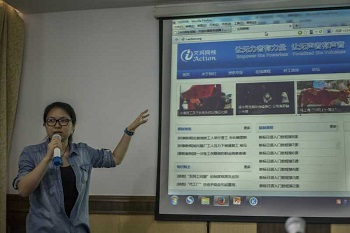Project
Empowering Vulnerable People through Internet: E-Learning Initiative for Young Migrant Workers in China
- China
- April 2015
The project succeeded in meeting its targets in its final phase, including the development of 20 proposals and petitions by young migrant workers and CSOs working with them, concerning desired improvements in working and living conditions. Of these, eight described practical initiatives or small projects. Each of the eight was awarded a small grant to implement the plans proposed. While some students gained valuable experience, many of those involved lacked the commitment to taking an active role in support of the young migrant workers. Further, the role assigned to the students in “assisting young migrant workers using social media” was vague, and they lacked guidance on what to do and how to do it. In addition, the students, as well as the academic coordinators and the CSO representatives interviewed, all commented on the wide social gap between students and the young workers, which made communication difficult.
Lessons from Project
💡
- Tools for knowledge
- China
- April 2015
There was little incentive for the CSOs in China to invest in developing the student connection. The project made no financial provision to assist the partner CSOs, most of which were struggling to survive.
💡
- Tools for knowledge
- China
- April 2015
The grantee was caught out by the rapidity of social and technological change which made internet cafes redundant as a site for social communication, based on computer-based email and file or photo exchange, among young migrant workers. The project vision was of young migrant workers sitting in neighbourhood cafes, taking part in substantive discussions through micro-blogs and chat groups, and taking part in E-learning courses, uploaded to the project web-site. Internet cafes were going out of business because of dwindling numbers of customers.
💡
- Tools for knowledge
- China
- April 2015
Three of the problems encountered, which arose from mistaken assumptions about three of the principal set of participants in the project, were rather basic, suggesting gaps in the initial needs analysis and feasibility assessment conducted by the project team. The first concerned the primary beneficiaries, the young migrant workers, and a lack of fit between the character of planned project activities and their way-of-life. It was discovered that they had limited time availability and an unpredictable schedule of working hours. Given what is widely known about the conditions of work and living of migrant workers, this should not have been a surprise.
💡
- Tools for knowledge
- China
- April 2015
The grantee may wish to consider including a mix of government-supported (or government-approved) partners, along with independent CSOs in its projects. It is also recommended that it consider cooperation with CSOs and local agencies with a social service orientation, injecting a rights-based agenda into a broader approach to meeting the needs of young migrant workers.
💡
- Tools for knowledge
- China
- April 2015
In developing future projects, in consultation with its partners and associates, the grantee should ensure that detailed guidelines are developed to ensure that partners and beneficiaries have a road map on: what to do; how to do it; with whom; where; when; and, how frequently.
💡
- Tools for knowledge
- China
- April 2015
The project tried to do too much with too many beneficiaries in too many locations. A more focused project would have been both more efficient and more effective. For the most part, project resources were deployed well in support of the project plan. However, in retrospect, given the limited success of the E-Learning and social media components, as well as the limited duration of the engagement that the project had with most youth trainees, there are questions as to whether project resources were utilized in the most efficient way to support the designated beneficiaries.
💡
- Tools for knowledge
- China
- April 2015
The project was built around the contribution that social media and E-Learning, through the project web-site, might make to connecting workers to each other and a wider world of knowledge, ideas and practical possibilities, to help them to change their lives for the better. Unfortunately, it was found that young workers were not familiar with computers, had limited access to them, and little time or inclination to work on E-Learning courses. Inexpensive smart phones are favoured by young migrant workers as their tool for communication. However, the phones are used for social purposes and entertainment and have limited capacity for downloading large files. This limited to a considerable degree the relevance of project strategy in this sphere.
💡
- Tools for knowledge
- China
- April 2015
Student participants seem to have learned a great deal about the experience of migrant worker life in China. Around 30 students became thoroughly engaged and met frequently. Once the training was completed, the students who remained involved pursued two lines of activity: to work with CSO partners in support groups to assist workers groups with effective use of social media, and, secondly, to assist the grantee with running the web-site dedicated to young migrant workers.
💡
- Tools for knowledge
- China
- April 2015
In the sphere of social media, the grantee assisted the trainees in establishing micro-blog and instant messaging accounts with well-known service providers in China. A small number of the trainees, drawn from the ranks of the Focal Points, emerged as young labour leaders, playing important roles in organizing their colleagues to petition employers and local government on specific labour grievances, and, at times, mobilizing other YMWs to take part in strike or protest action.
